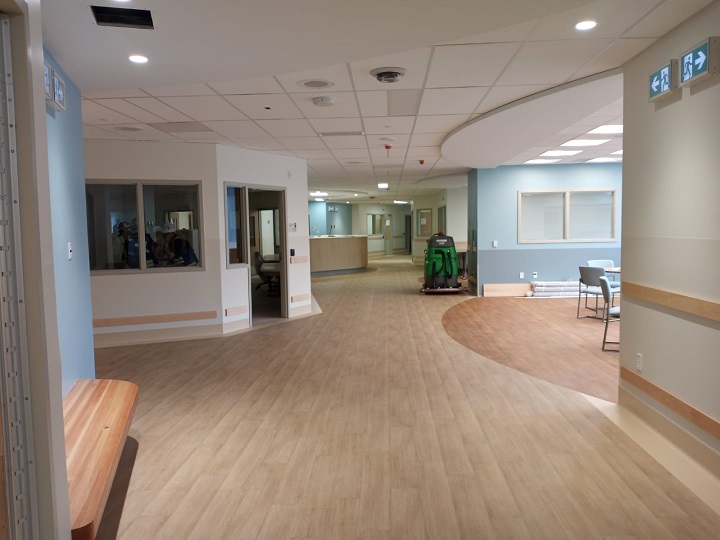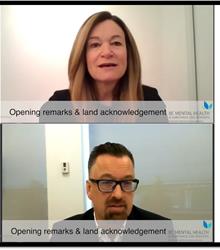
Researchers often say it takes an average of 17 years for study findings to make their way into practice. BC Mental Health and Substance Use Services is working to shorten that timeline to ensure care for people with complex mental illness and addiction is informed by the latest and best research—and the Red Fish Healing Centre for Mental Health and Addiction will be a catalyst.
“As well as being a state-of-the-art treatment facility, Red Fish is home to important, leading-edge research and knowledge-exchange,” says Dr. Vijay Seethapathy, the chief medical officer at BC Mental Health and Substance Use Services. “We’re in a unique position to add to the body of existing research and evidence-based data on this population while also applying the findings to care.”
Change-making research that will enhance knowledge and treatment requires dedicated space, resources and participants.

“When we do research, we want to tease out complex factors,” Dr. Seethapathy says. “It’s not always easy to do research with people living with complex and severe mental illness, substance use issues, and trauma. Most of the research to date has excluded these groups, but now, at Red Fish, we can advance this considerably.”
The centre will provide researchers with access to concurrent disorders clients and have dedicated space for research. Over 20 research assistants and other team members will be working on site.
Researchers at Red Fish are currently involved in studies focusing on a wide range of topics relating to concurrent disorders. One is ROAR (reducing overdose and relapse) Canada, a five-year project based on the experiences of 1,500 clients in and out of treatment. It is the largest-ever sample of people with severe concurrent disorders, a population that is often difficult to reach. Red Fish is one of three facilities participating in the study, alongside the Heartwood Centre for Women and St. Joseph’s Healthcare Hamilton. By collecting data before, during, and after clients’ stays, researchers can learn about their healthcare experience and how integrated treatment changes outcomes. The overall goal is to learn how overdose and relapse happen after discharge, and how to prevent them.
“It’s not always easy to do research with people living with complex and severe mental illness, substance use issues, and trauma. Most of the research to date has excluded these groups, but now, at Red Fish, we can advance this considerably.”
“The size of this particular study allows us to look at subgroups within our population,” says Dr. Christian Schütz, research and education medical manager at the Red Fish Healing Centre. “Who are the clients or patients doing well or not so well, and what are the factors that make people more or less successful?”
Other research topics at Red Fish include the value of groups relating to difficult childhood experiences, art therapy, rest and sleep monitoring with wearables, mothers and children in substance use treatment, as well as others on addiction medicine, and treatment for specific psychosis and addiction combinations.
In addition to leading research, Red Fish is applying the newest and best evidence from around the world in client care. One area of application is the length of treatment. Typically, a stay at the Coquitlam facility ranges from six to nine months.
“This gives somebody with multiple problems who comes from a marginalized background the opportunity to recover,” says Dr. Schütz.
“We know that it takes at least three months to be successful in recovery. The sad thing is that this has led to most programs being no longer than three months. And that is not setting people up for success in the long run.”
Research into trauma-informed care has also influenced treatment at Red Fish. While care across BC Mental Health and Substance Use Services has always been trauma-informed, the Red Fish Healing Centre’s building design enables this even further.
“What’s exciting is that going into a new, state-of-the-art facility, with more space, light, fresh air, green spaces and art, is going to strengthen all the work that we have been doing at Burnaby Centre, enhancing our outcomes even more.”
Based on insights from clients at the Burnaby Centre for Mental Health and Addiction on the impact of the physical environment on the quality of care, Red Fish was built to facilitate privacy, ownership, ease of orientation and more.
“You want to have a calming, soothing space,” says Dr. Seethapathy. “What’s exciting is that going into a new, state-of-the-art facility, with more space, light, fresh air, green spaces and art, is going to strengthen all the work that we have been doing at Burnaby Centre, enhancing our outcomes even more.”
Advancing provincial knowledge
 Given the complexity of concurrent disorders clients, individual causes can be difficult to identify—never mind treat. This makes the knowledge gleaned by BC Mental Health and Substance Use Services even more important. Our researchers will continue to share their findings in peer-reviewed publications and conferences, including the B.C. Concurrent Disorders Conference, throughout B.C. and beyond.
Given the complexity of concurrent disorders clients, individual causes can be difficult to identify—never mind treat. This makes the knowledge gleaned by BC Mental Health and Substance Use Services even more important. Our researchers will continue to share their findings in peer-reviewed publications and conferences, including the B.C. Concurrent Disorders Conference, throughout B.C. and beyond.
